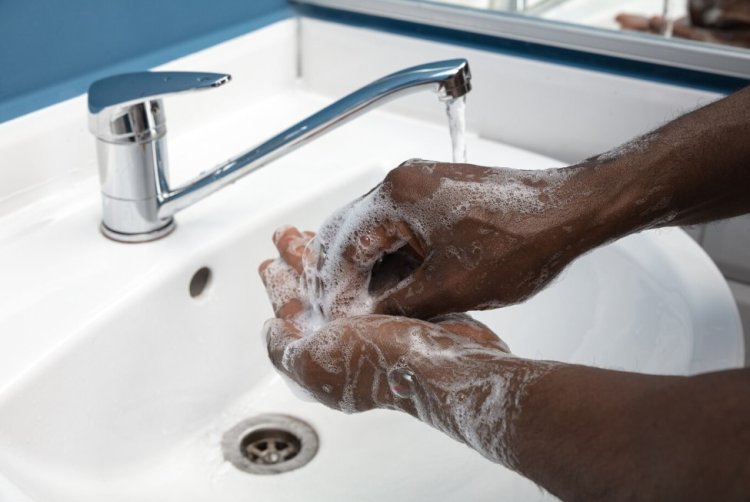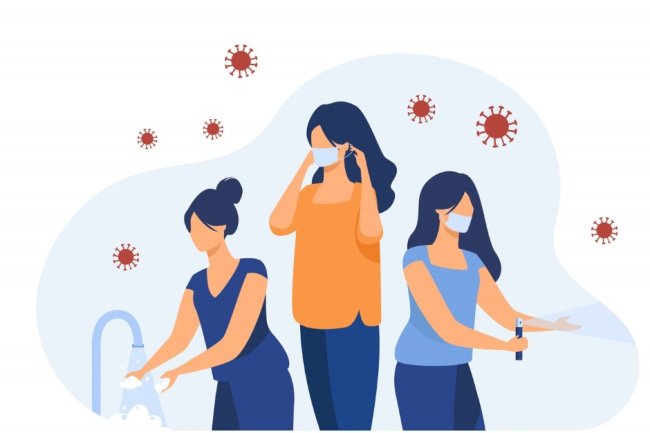Hygiene Habits that Keep Illness at Bay
In the perpetual battle against illnesses, our strongest weapon often lies in the simplest of habits: personal hygiene. Maintaining cleanliness in our daily lives is not just a practice; it's a shield that guards us against a myriad of diseases. Let's delve into the essential aspects of personal hygiene and how they can keep illnesses at bay.

In the realm of health and well-being, the significance of personal hygiene cannot be overstated. It's not merely a practice; it's a fundamental pillar that fortifies our defenses against a multitude of illnesses. In this NourishNetBlog.com series, we embark on a profound exploration of hygiene habits, illuminating their critical importance in preserving our health.
The Personal Connection: Why Hygiene Habits Matter to Me
In my public health education journey, I have experienced firsthand the consequences of inadequate hygiene practices. Outbreaks that could have been prevented, lives that could have been saved – these experiences ignited a fire within me. I am committed to ensuring that everyone, regardless of their background or location, has access to vital hygiene education. This commitment drives my passion for public health education and self-care actions for individuals to reap positive health outcomes wherever they are.
Why I Am Your Ideal Guide: A Fusion of Expertise and Empathy
I offer to you not just my extensive public health expertise but also a deep sense of empathy. I understand the challenges individuals and communities face in adopting positive hygiene habits. Through relatable narratives, practical tips, and evidence-based insights, I aim to demystify hygiene practices, making them accessible and applicable to your everyday life.
Key Objectives of Our Hygiene Exploration
As we progress further into our hygiene journey, it’s essential to understand the specific objectives that will shape our exploration. Each objective represents a vital aspect of hygiene, aiming to provide you with a comprehensive understanding of how these practices can transform lives. Here are our objectives:
-
Importance of Personal Hygiene: Unveiling the foundational principles and psychological benefits of personal hygiene for holistic well-being.
-
Hand Washing: A Lifesaving Ritual: Exploring the science and techniques behind effective hand washing, a powerful tool against diseases.
-
Food Safety Practices: Guiding through proper storage and cooking methods, ensuring safe and nutritious meals for all.
-
Water Purification: Investigating accessible and sustainable purification methods, emphasizing the right to clean water for every community.
-
Hygiene in Healthcare Settings: Examining stringent protocols followed in medical facilities, ensuring patient safety through advanced hygiene practices.
-
Hygiene Education in Schools: Showcasing innovative approaches to teaching hygiene, nurturing healthy habits from childhood for a better future.
-
Hygiene in Disaster and Humanitarian Relief: Highlighting challenges faced in crisis zones and innovative solutions for providing hygiene amidst adversity.
Let’s delve deeper into these key objectives:
1. Importance of Personal Hygiene: Unveiling the Significance of Personal Cleanliness
Personal hygiene is not merely about appearance; it is a cornerstone of overall health. Proper hygiene, including regular bathing, oral care, and clean clothing, prevents the accumulation and spread of harmful bacteria and viruses. Maintaining cleanliness reduces the risk of skin infections, bad breath, and various diseases. Moreover, good personal hygiene fosters self-confidence and positive social interactions, making it a crucial aspect of daily life.
2. Hand Washing: The Simplest Yet Most Powerful Tool: A Deep Dive into Hand Hygiene
Hand washing is a fundamental practice that significantly reduces the transmission of diseases. By washing hands thoroughly with soap and water, individuals eliminate germs picked up from various surfaces. This simple act prevents the spread of infections like colds, flu, and gastroenteritis. Understanding the correct technique, including scrubbing for at least 20 seconds, ensures the removal of pathogens. Regular hand washing, especially before meals and after using the restroom, forms a vital defense against illnesses.
3. Food Safety Practices: Ensuring Safe Consumption
Safe food handling, storage, and preparation are paramount to preventing foodborne illnesses. Proper cooking temperatures, refrigeration, and avoiding cross-contamination are key practices. Individuals must understand the risks associated with undercooked meat, unpasteurized dairy, and contaminated produce. By adhering to food safety guidelines, individuals protect themselves from severe illnesses like salmonella and E. coli infections. Awareness of these practices is particularly crucial when preparing raw meats and seafood, ensuring that meals are both delicious and safe.
4. Water Purification: Safeguarding Health Through Clean Water
Access to clean water is a fundamental human right, yet many face challenges in ensuring its purity. Boiling, filtration, and chemical treatments are common methods to purify water. Communities lacking clean water sources are susceptible to waterborne diseases like cholera and dysentery. Implementing proper purification techniques, even in resource-limited areas, can prevent these diseases. Understanding these methods empowers individuals to take charge of their water sources, ensuring the health and well-being of their families.
5. Hygiene in Community Settings: Extending Cleanliness Beyond Individual Practices
Hygiene should not end at the individual level; it must permeate communal spaces. Schools, workplaces, and public facilities demand regular cleaning and sanitation. Institutions play a vital role in maintaining hygienic environments, including providing soap and hand sanitizers. Adequate waste disposal and clean restroom facilities are essential in public spaces. By upholding cleanliness in shared areas, communities create safer environments for all, reducing the risk of contagious diseases and promoting overall well-being.
6. Hygiene Education and Behavioral Change: Promoting Hygiene Awareness and Positive Habits
Educational initiatives are pivotal in fostering behavioral change regarding hygiene practices. Informative workshops, engaging campaigns, and interactive sessions are effective ways to raise awareness. By understanding the behavioral cues that promote positive habits, communities can create sustainable change. Educated individuals are more likely to influence their peers and families, creating a ripple effect that strengthens hygiene practices at the community level.
7. Hygiene and Disease Prevention: Connecting Cleanliness to Overall Health
The connection between hygiene and disease prevention is indisputable. Hygienic practices directly reduce the risk of diseases such as diarrhea, respiratory infections, and skin ailments. Proper hygiene also plays a crucial role in controlling epidemics, especially in densely populated areas. Understanding this link motivates individuals to maintain cleanliness not just for themselves but for the collective health of their communities. By recognizing the tangible impact of hygiene on disease prevention, individuals are inspired to adhere to these practices diligently, ensuring a healthier and safer society.
Each objective represents a chapter in our collective effort to understand and embrace hygiene habits. Join us in the upcoming segments, where we will unravel practical tips that will equip you with the knowledge to transform your life and the lives of those around you.
Stay with us on this enlightening journey, and together, let’s create a world where hygiene is not just a practice but a way of life.
Read More: Why Nutrition is the King When it comes to Wellness and Longevity
Practical Tips for Personal Hygiene
Here are seven practical tips for personal hygiene that can significantly improve your overall health and well-being:
-
Frequent Hand Washing: Wash your hands thoroughly with soap and water for at least 20 seconds, especially after using the restroom, before eating, and after coughing or sneezing.
-
Oral Hygiene: Brush your teeth at least twice a day and floss daily to prevent dental issues. Consider using mouthwash to kill bacteria and maintain fresh breath.
-
Regular Bathing: Take a shower or bath daily to cleanse your body, removing sweat and bacteria. Pay attention to often overlooked areas like behind your ears and between your toes.
-
Nail Care: Keep your nails clean and trimmed to prevent the accumulation of dirt and bacteria. Avoid biting your nails, as it can introduce germs into your mouth.
-
Proper Respiratory Hygiene: Cover your mouth and nose with a tissue or your elbow when you cough or sneeze. Dispose of tissues immediately and wash your hands afterward to prevent the spread of germs.
-
Clean Clothing: Change into clean clothes daily, especially underwear and socks. Regularly wash your clothes, bed linens, and towels to prevent the buildup of bacteria and odors.
-
Foot Care: Wash your feet daily, especially between the toes, and keep them dry to prevent fungal infections. Wear clean socks and well-fitting shoes to maintain foot hygiene.
Remember, consistent practice of these hygiene tips forms the foundation of good health and prevents the spread of illnesses.
Understanding the Essence of Personal Hygiene
Picture this: our world is a tapestry of unseen threats, microscopic invaders that can wreak havoc on our health. These threats, in the form of germs, bacteria, and viruses, are omnipresent. However, within our grasp, we hold the power to repel these invaders, and that power is embodied in the simple yet transformative acts of personal hygiene.
The Immense Impact of Hygiene on Health
Hygiene isn't a mundane routine; it's a potent shield that safeguards us from diseases. From the basic act of regular hand washing, which has been proven to prevent the spread of infections, to the intricate practices of food safety and water purification, hygiene habits are our most reliable allies in the battle for well-being.

My Journey in Public health education: Paving the Path of Prevention
My journey in public health education has been more than a profession; it's been a calling. Witnessing preventable illnesses ravage communities, I realized the immense impact of education in healthcare system. It became clear that preventing diseases before they occur is perhaps one the greatest noble actions we should all collectively seek to achieve. Don't they say prevention is better than cure? Thus, my mission evolved: to impart knowledge, especially in the realm of personal hygiene, to individuals and communities.
Read More: Nutrition and Disease Prevention: You Are What You Eat
Join Me in this Transformative Journey: Together, We Can Make a Difference
I invite you to join me in this transformative odyssey. As long as you adhere to the insights I have provided, I promise you my friends, actionable insights, and a supportive guide in your pursuit of a healthier, safer life.
Remember, your health is your most precious asset. By embracing the wisdom of hygiene habits, we can collectively pave the way for a future where diseases are prevented, lives are enriched, and well-being reigns supreme.
Subscribe to our blog, and let's embark on this empowering journey together.
Resources:
https://en.wikipedia.org/wiki/Hygiene
https://www.cdc.gov/hygiene/personal-hygiene/index.html
https://my.clevelandclinic.org/health/diseases/24401-fungal-infections-mycosis
What's Your Reaction?




















